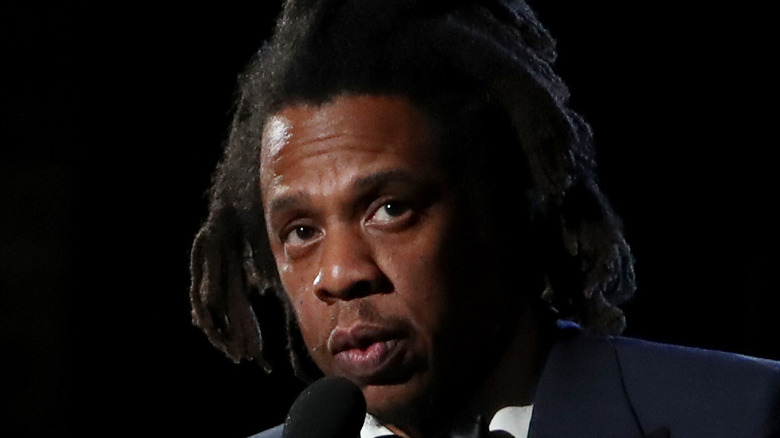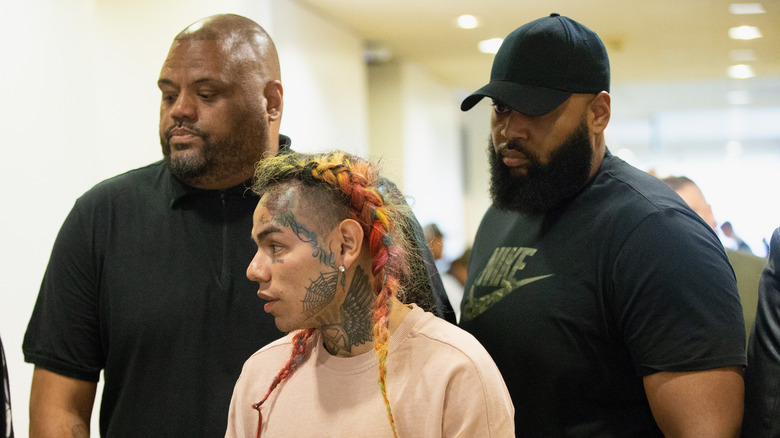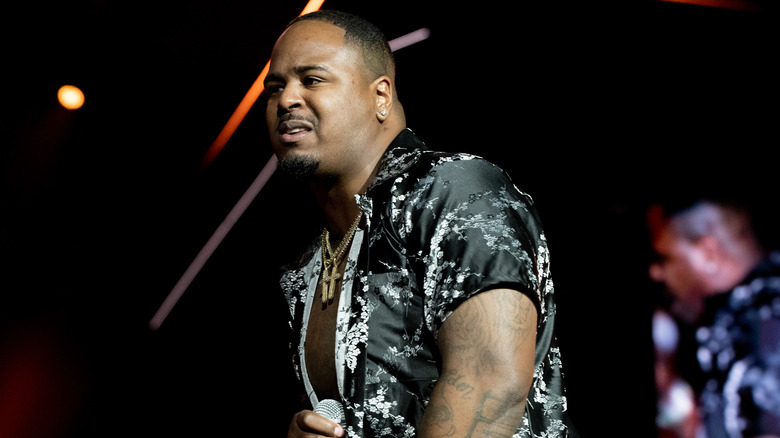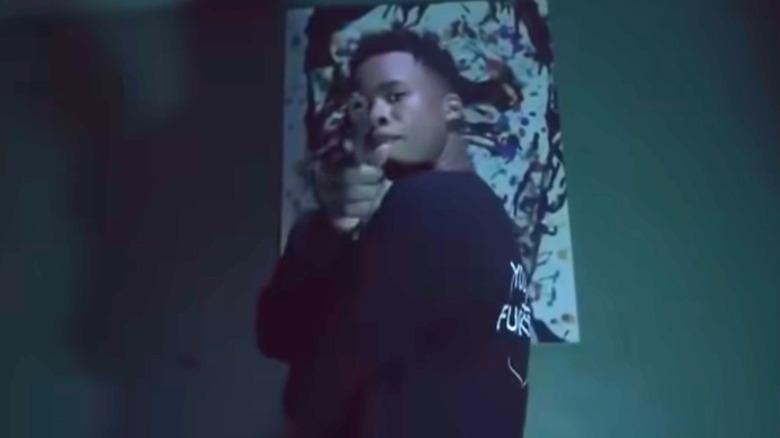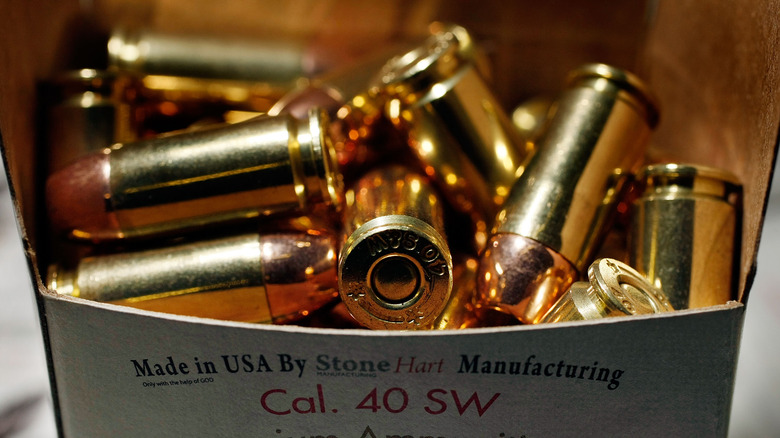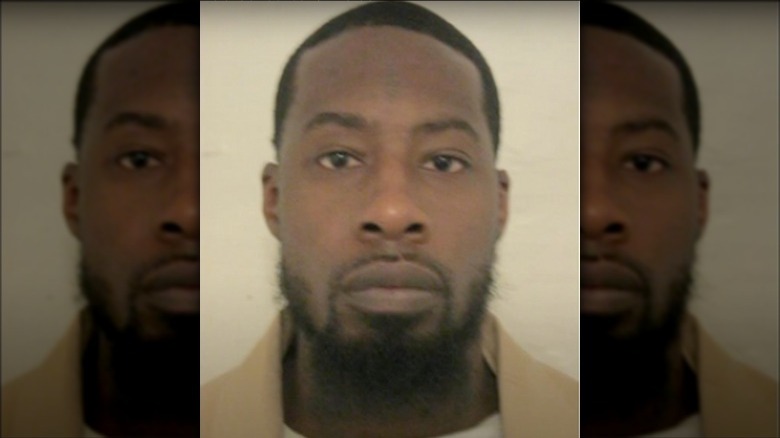Times Rap Lyrics Have Been Used As Evidence
In January 2022, major news outlets like The Guardian reported that a group of high profile names from the world of music — led by the rapper Jay-Z as well as Killer Mike, Fat Joe, Kelly Rowland, and Meek Mill — had signed an open letter demanding that New York legislators pass a new reform bill limiting prosecutors' use of rap lyrics as evidence in criminal trials. Titled "Rap Music on Trial," the bill would require prosecutors to present "clear and convincing evidence" that lyrics from songs reflect real life; that they are "literal, rather than figurative or fictional," according to Rolling Stone.
Supporters of the reforms make the obvious point that the use of art as evidence impacts freedom of expression. According to state senator Jamaal Bailey, "the use of rap and hip-hop lyrics in particular is emblematic of the systemic racism that permeates our criminal justice system" (per The Guardian). This has been made abundantly clear in the U.K., where rappers like Digga D who wound up in court were given "criminal behavior order[s]" that bar them from composing lyrics "using certain names, locations, and themes" (also per The Guardian).
Any such cases are not rare. Academics Erik Nielson and Andrea Dennis, co-authors of the book "Rap On Trial," have uncovered hundreds of cases in which rap lyrics have been cited as evidence of real-life crimes. Here are a few of the most notorious instances.
6ix9ine
The legal battles involving 6ix9ine, aka Tekashi69, have transfixed the hip-hop community since 2018, just as he was breaking into the industry. The New York City rapper, born Daniel Hernandez, was widely known for his affiliation with the infamous Nine Trey Gangsta Bloods, described by the U.S. Attorney's Office for the Eastern District of New York as a "violent set of the Bloods street gang."
Shortly after his rise to stardom, 6ix9ine was arrested and charged with committing multiple offenses, including "racketeering, carrying a firearm, assault with a dangerous weapon, and conspiracy murder charges," according to the BBC. Before the trial, he was facing a minimum of 47 years to life in prison.
But in a move that outraged many of his former affiliates, 6ix9ine chose to cooperate with prosecutors, who used the trial to highlight lyrics from his single "GUMMO," which they claimed were threats seemingly referencing inter-gang feuds. The prosecution also used footage of Nine Trey members from his music videos to paint an incriminating picture of the gang, numerous members of which were tried alongside 6ix9ine, per The New York Times.
During the trial, it came to light that 6ix9ine wasn't, in fact, a gang member, as his lyrics and image had suggested, and his affiliation with the Nine Trey Gangsta Bloods was an arrangement designed to give the rapper credibility. He was sentenced to a total of two years in prison and has remained ostracized from his former circle despite some continued commercial success.
Drakeo The Ruler
Drakeo the Ruler — born Darrell Wayne Caldwell — quickly rose to become one of the hottest talents in rap after emerging with his first mixtape back in 2015. However, legal troubles soon derailed him. Per Tablet, Drakeo's first major charge came in 2017 when Los Angeles police raided the compound the rapper shared with his crew — the Stinc Team — and found a stash of weapons they claimed was the property of Drakeo. He spent a year in prison, but the worse was yet to come: The rapper was accused of being involved in the murder of 24-year-old Davion Gregory, an alleged gangster affiliated with the Inglewood Bloods.
It was argued that Drakeo had supplied the weapons used in the murder to accomplices with another target in mind: RJ, a fellow rapper with whom Drakeo had engaged in a long-running public feud. During Drakeo's trial, the district attorney presented lyrics from the rapper's famous "Flex Freestyle," a diss against RJ in which the rapper imagines having his rival tied up in the back of his car. Though the lyrics in no way reflected what Drakeo was accused of, jurors were invited to read the lyrics as an illustration of Drakeo as a real-life criminal.
According to John Hamasaki, Drakeo's lawyer, the prosecution was "essentially putting [Drakeo] on trial for a possible life sentence based on the theory his rap lyrics had demonstrated his intent to murder a guy. But somebody else completely unrelated was murdered. But maybe they were there at the same time. It was a really, really tenuous theory" (via Stereogum).
Drakeo the Ruler was murdered backstage at an L.A. concert in December 2021.
Tay-K
California-born Taymor McIntyre, who goes by the moniker Tay-K, was only 19 years old when he was sentenced to 55 years in prison for his part in a home invasion in July 2016. As reported by Vice, the incident led to the killing of Ethan Walker, a 21-year-old father of one.
Prior to his conviction, McIntyre escaped from house arrest by cutting through his ankle tag and absconding with a co-defendant to San Antonio, Texas, according to the Fort Worth Star-Telegram. There, the rapper filmed the video for "The Race," a song detailing his escape which would — on a wave of notoriety and national headlines — go on to become a Billboard-charting hit.
The jury in his murder trial was presented with footage and stills from the video for "The Race," which depicted the rapper posing with guns and his own wanted poster. They were also given printouts of the song's lyrics taunting the police as they pursued him, per The Fader. Tay-K was eventually recaptured, and he remains behind bars at San Antonio's Bexar County Jail, where he plans to appeal his sentence.
Lawrence Montague
In 2019, Courthouse News published a document from the court of appeals of Maryland concerning the case of Lawrence Montague, a rapper who had been indicted for the fatal shooting of a man named George Forrester. According to the document, Montague was believed to have killed Forrester after the latter attempted to pay Montague for cocaine using a fraudulent $100 bill, leading to an altercation. Montague was identified as the drug dealer and shooter in the incident by a witness and was kept at Anne Arundel County Detention Center.
Three weeks before his trial was due to begin, Montague made a phone call to an unidentified man from the detention center and asked him to record a rap verse he had written. Montague's lyrics threatened would-be "snitches" and made reference to .40 ammunition — the same that was used in the killing of Forrester. The verse was uploaded to Instagram, after which Montague's prosecutors successfully moved to have the recording included in the trial as evidence.
Montague was convicted of "second-degree murder, first-degree assault, use of a firearm in a crime of violence, use of a firearm in the commission of a felony, and wearing, carrying, or transporting a handgun on or about the person" (per Courthouse News). His appeal against the use of his lyrics as evidence in his case was rejected.
Vonte Skinner
One of the most egregious cases of rap lyrics being used as evidence against an accused party occurred in New Jersey in 2008, when the music of Vonte Skinner was presented to the jury while he was on trial a 2005 shooting, according to The New York Times. Though many of Skinner's lyrics did indeed evoke gang culture, none were about the crime in question, and many of the verses predated the trail — and the crime — by several years by the time the jury was asked to examine them. Other evidence took the form of witness statements, but despite numerous inconsistencies, the court still found Skinner guilty of attempted murder and sentenced him to 30 years in prison.
However, in 2012, Skinner's conviction was finally overturned when the New Jersey Supreme Court ruled that the rapper's lyrics should never have been admissible as evidence, stating: "We have a significant doubt about whether the jurors would have found defendant guilty if they had not been required to listen to the extended reading of these disturbing and highly prejudicial lyrics," per the same source.
